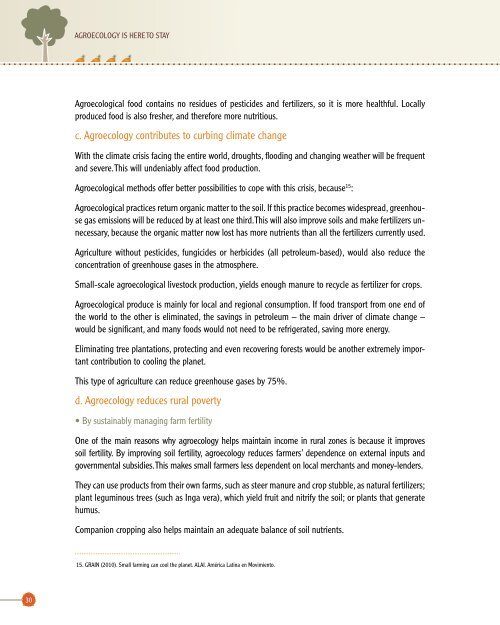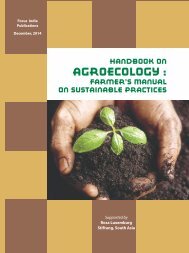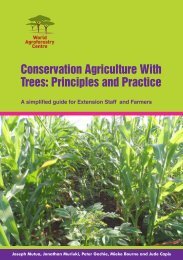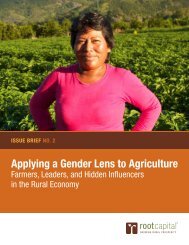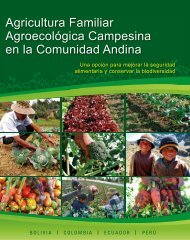1JVhyl7
1JVhyl7
1JVhyl7
You also want an ePaper? Increase the reach of your titles
YUMPU automatically turns print PDFs into web optimized ePapers that Google loves.
Agroecology is here to stay<br />
Agroecological food contains no residues of pesticides and fertilizers, so it is more healthful. Locally<br />
produced food is also fresher, and therefore more nutritious.<br />
c. Agroecology contributes to curbing climate change<br />
With the climate crisis facing the entire world, droughts, flooding and changing weather will be frequent<br />
and severe. This will undeniably affect food production.<br />
Agroecological methods offer better possibilities to cope with this crisis, because 15 :<br />
Agroecological practices return organic matter to the soil. If this practice becomes widespread, greenhouse<br />
gas emissions will be reduced by at least one third. This will also improve soils and make fertilizers unnecessary,<br />
because the organic matter now lost has more nutrients than all the fertilizers currently used.<br />
Agriculture without pesticides, fungicides or herbicides (all petroleum-based), would also reduce the<br />
concentration of greenhouse gases in the atmosphere.<br />
Small-scale agroecological livestock production, yields enough manure to recycle as fertilizer for crops.<br />
Agroecological produce is mainly for local and regional consumption. If food transport from one end of<br />
the world to the other is eliminated, the savings in petroleum – the main driver of climate change –<br />
would be significant, and many foods would not need to be refrigerated, saving more energy.<br />
Eliminating tree plantations, protecting and even recovering forests would be another extremely important<br />
contribution to cooling the planet.<br />
This type of agriculture can reduce greenhouse gases by 75%.<br />
d. Agroecology reduces rural poverty<br />
• By sustainably managing farm fertility<br />
One of the main reasons why agroecology helps maintain income in rural zones is because it improves<br />
soil fertility. By improving soil fertility, agroecology reduces farmers’ dependence on external inputs and<br />
governmental subsidies. This makes small farmers less dependent on local merchants and money-lenders.<br />
They can use products from their own farms, such as steer manure and crop stubble, as natural fertilizers;<br />
plant leguminous trees (such as Inga vera), which yield fruit and nitrify the soil; or plants that generate<br />
humus.<br />
Companion cropping also helps maintain an adequate balance of soil nutrients.<br />
15. GRAIN (2010). Small farming can cool the planet. ALAI. América Latina en Movimiento.<br />
30


